
Twenty water sector leaders and an audience of more than 150 discussed a new paradigm for water at the Chicago Water Summit 2014: Global Lessons from Great Water Cities. Photo courtesy of Kieffer Photography.
Any community can learn a lesson or two from cities leading the way in water resource management. Leaders from these cities, representing both the public and private sectors, gathered at the Chicago Water Summit 2014: Global Lessons From Great Water Cities on July 21, to share insight into adapting to water-related challenges. And one thing was clear: all communities share similar problems and goals.
“The moment you discuss water, you are shocked at how this is a challenge for every city leader, whether in the developed or developing world,” said Chicago Mayor Rahm Emanuel at the summit.
Twenty leaders from around the world discussed a new paradigm for water, incorporating smart and progressive approaches to increase resilience, enhance daily connection to and visibility of water, and conserve resources. The Water Environment Federation (WEF; Alexandria, Va.) and World Business Chicago organized the summit with support from the City of Chicago, Metropolitan Water Reclamation District of Greater Chicago, and Chicago Sister Cities International.
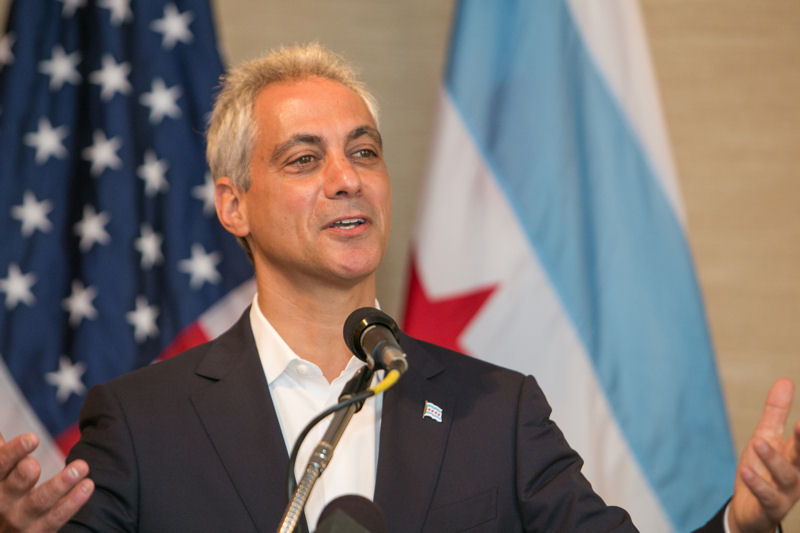
As opening speaker for the Chicago Water Summit 2014, Chicago Mayor Rahm Emanuel discussed how shared water challenges connect people and described his vision for Chicago as a leading water city. Photo courtesy of Kieffer Photography.
As opening speaker, Emanuel explained how shared water challenges connect people and how he hopes Chicago can be a “leader in water technology, water infrastructure, and how to appreciate the importance of fresh water to our daily lives,” he said.
And because the Great Lakes hold a quarter of the world’s surface fresh water, Emanuel hopes to place Chicago at the center of the discussion about access to this precious resource. “It is our Grand Canyon, our Yellowstone. How we deal with it, how we manage it, and how we are stewards of it will define our future,” Emanuel added.
“[Water] is a strategic sector for the city of Chicago and many others around the world,” said Jeff Malehorn, World Business Chicago president and chief executive officer. “Leadership and collaboration is what it’s going to take to address the many challenges,” he added. Malehorn encourages all regions and localities continue to share ideas and take action, he added.
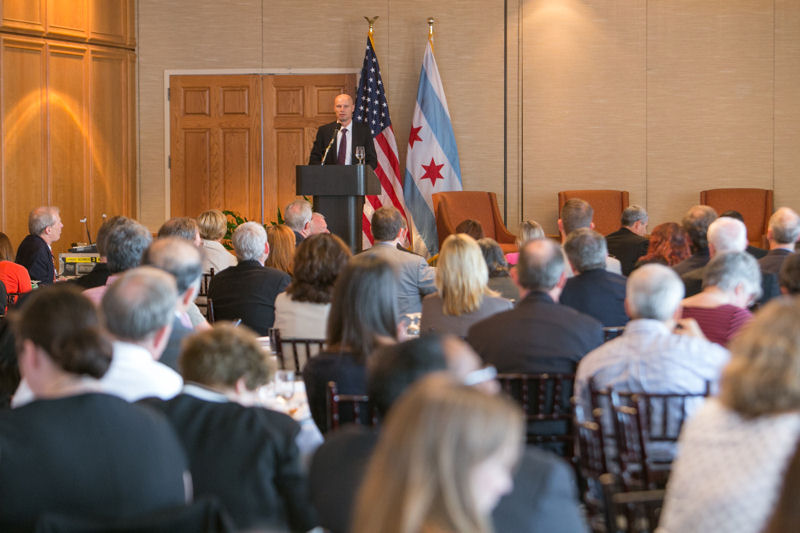
Henk Ovink, principal with Rebuild by Design (New York) and senior advisor to the secretary of U.S. Department of Housing and Urban Development, provided the luncheon keynote during the Chicago Water Summit 2014 luncheon. Photo courtesy of Kieffer Photography.
Because water is the key to life, it connects people, economy, and ecology. People must embrace living with water even with hazards posed by water scarcity, inadequate water quality, and water-related disasters. And this requires adopting a new perspective, explained summit luncheon keynote speaker Henk Ovink, principal with Rebuild by Design (New York) and senior advisor to the secretary of U.S. Department of Housing and Urban Development.
“Have that future perspective be inspired by scenarios, design, and collaboration to get a clear focal point on how to act,” Ovink said. Water management requires planning to protect water resources and to respond to water-related disasters comprehensively. “To rebuild in a resilient way, you have to be more innovative,” he said.
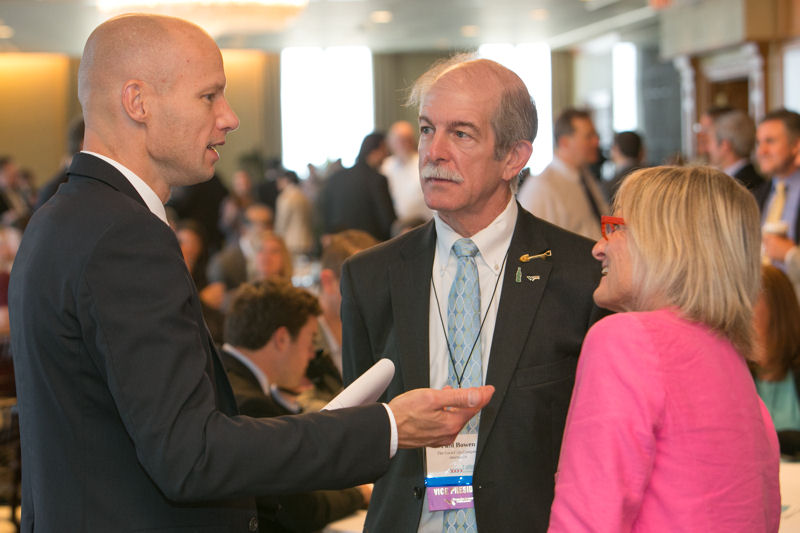
From left, Ovink talks to WEF Vice President Paul Bowen and WEF President Sandra Ralston at the summit. Photo courtesy of Kieffer Photography.
Because water does not recognize boundaries, people around the world must work together to foster understanding, identify interdependencies, identify opportunities, and devise solutions to problems, Ovink said. “The most important part is collaboration because that’s the only way to deal with water,” he added. “Working together builds the support of communities and increases the capacity for understanding so that water becomes part of the culture.”
The challenges communities face already have spurred collaboration, said WEF President Sandra Ralston. “In our world, we often see water as a challenge but it is also a solution,” she said.
 |
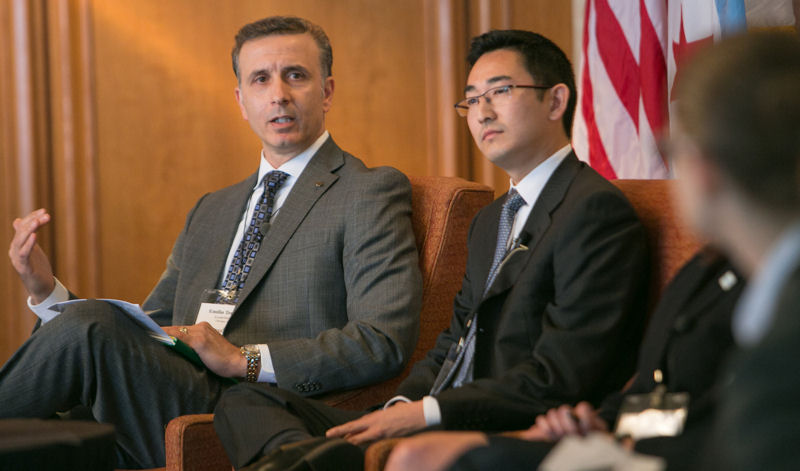 |
| Global leaders speak at the Chicago Water Summit 2014. Click on each photo for more details. Photos courtesy of Kieffer Photography. | |
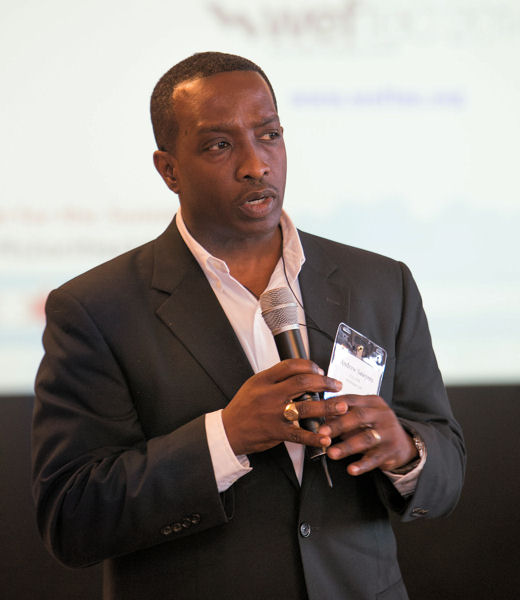 |
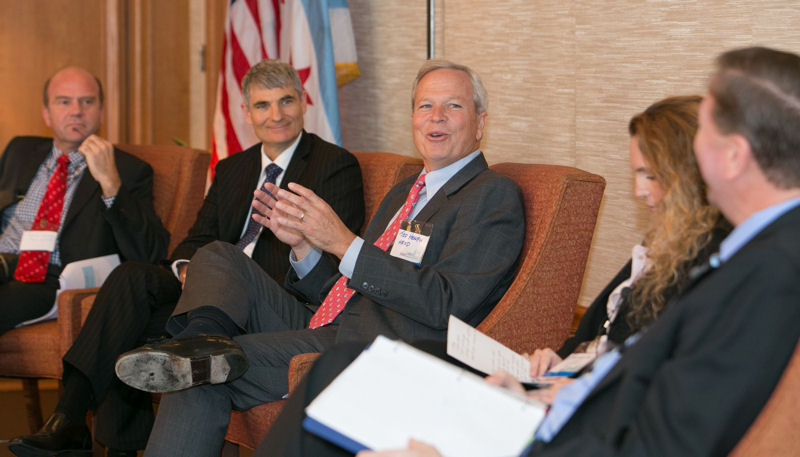 |
WEF plans to foster discussion and to continue sharing perspectives from water-management leaders. The next in the series will be held during WEFTEC® 2014 in New Orleans. During the session “Great Water Cities: Paths to Livability, Prosperity, and Resilience” attendees can learn about smart approaches to managing water demands, increasing resiliency, enhancing livability, and conserving resources in the face of climate change, extreme events, utility emergencies, and natural disasters. Held Sept. 29, from 10:30 a.m. to noon in Great Hall A/B, the session will feature input from U.S. Environmental Protection Agency Administrator Gina McCarthy and water sector leaders from France, New Zealand, and New York.
“WEF has begun using the term ‘Great Water Cities’ to describe these leaders and the examples and insights they provide” according to WEF Executive Director, Eileen O’Neill, in the World Water article “What Great Water Cities Can Teach Us about Sustainable Urban Water Management.” Sharing experience across sectors and physical borders is important to addressing shared water challenges and “WEF is helping bring these diverse voices … together by convening a series of conversations to foster dialogue and identify effective and enabling practices,” she said in the article.
— Jennifer Fulcher, WEF Highlights








September 24, 2014
Featured, WEF Resources & Efforts